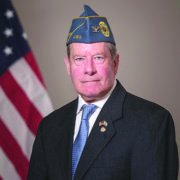September 11, 2001 to September 11, 2021 and Beyond
By Nelson L Mellitz, National Vice Commander
I planned to write my first article as your National Vice Commander about the ever-increasing anti-Semitism in the U.S. However, recent events in Afghanistan have grabbed the attention of the world, as well as the Jewish military and veteran’s community, so I changed the subject of my article.
This month, we think back to the September 11, 2001 terrorist attacks in New York City, at the Pentagon, and Flight 93 where passengers revolted against the terrorists who intended to crash the plane into the White House or Capitol in Washington, D.C. The plane crashed near Shanksville, Pennsylvania, killing all 44 people on board.
Where were you on September 11, 2001 when you heard about the terrorist attacks on the United States? I was a few blocks away from the World Trade Center buildings in downtown New York City.
Did you know anyone on those planes or killed during the attacks? Debbie and I had Major LeRoy Homer, Jr., the First Officer of United Airlines Flight 93, over our house for dinner a few weeks before the attacks. LeRoy was an Air Force Academy graduate and my U.S. Air Force Academy Liaison Officer trainee. I also knew three others who worked in the World Trade Towers that took the same 5:45 a.m. bus I did to New York City, who did not survive the attacks.
The events 20 years ago shocked Americans and changed the course of our lives as well as the country’s military positioning and the government’s world view. In December 2001, the U.S. became entangled in a 20-year long war in Afghanistan to depose the Taliban-led government which harbored the terrorist groups that attacked us on 9/11. On May 2, 2011, Seal Team 6 killed Osama bin Laden, the planner of the 9/11 attacks, who was hiding in Pakistan.
President Obama declared the end of our combat mission in Afghanistan in 2014, however thousands of U.S. and allied uniform members and U.S. civilian advisors and contractors remained in Afghanistan to train and support Afghan troops. According to the Defense Department, more than 2.7 million U.S. service members served in the Afghanistan and Iraq war zones since 2001.
Fast Forward – The U.S. military leaves no one behind
The U.S. military services made a sacred commitment to leave no one behind on the battlefield. This ethos is even embedded in the military service creeds. Since World War I this ethos has applied to not only uniformed members but to U.S. citizens, allies, and others in danger.
It’s been 20 years since September 11 and President Biden declared that all U.S. troops would be out of Afghanistan by August 31, 2021. We have all seen on the news tens of thousands of people (Americans, Afghans, and others) rushing to the Hamid Karzai Airport to get on U.S. military planes that will carry them to freedom. We have to ask ourselves how many U.S. citizens, green card holders, Afghans that worked the U.S., and women and girls in danger were left behind. Could we have gotten everybody out of Afghanistan – leaving no one behind? What should we have left behind – military equipment, supplies, food, shelter, etc.?
The fog of war has raised its ugly head in what we currently hear from politicians and news outlets. There is often different and sometimes conflicting stories of what happened. A bipartisan congressional investigation is needed to determine what went right and wrong in the past 20 years and in the Afghanistan withdrawal.
G-d bless the United States of America and the families of those Killed in Action and Wounded in Action in Afghanistan and Iraq.
Volume 75. Number 3. 2021




